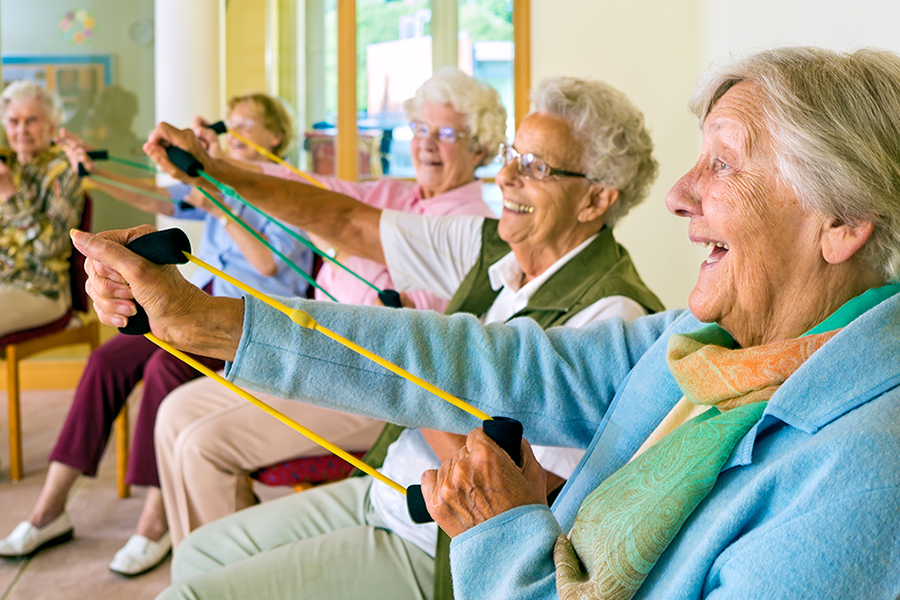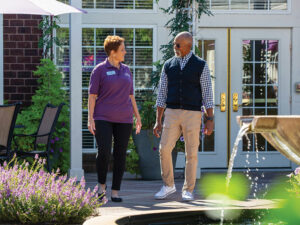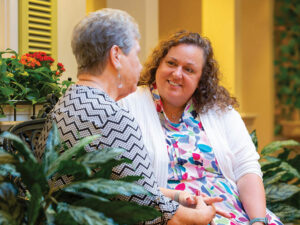An Abundance of Activities: Staying Active
There Are Many Ways to Encourage Safe & Fun Activity

Activity, whether vigorous or more serene, helps keep the mind and body healthy. This can be especially true for people with Alzheimer’s disease and dementia, who often experience a sense of isolation and withdrawal, which can lead to depression and physical deterioration. Planned activities can help alleviate these things while creating new experiences, prompting memories, and adding a sense of purpose and joy to life.
Safe & Fun Activity
If you are helping to care for a loved one with dementia, there are lots of ways you can encourage safe and fun activity. Though you may need to modify some activities to suit the mood of the day or stage of dementia, it’s still possible to encourage and support movement and physical pursuits. And you and your loved one will likely be rewarded with a sense of accomplishment.
Monitor & Modify
The most effective activity programs are based on personality, motivation, and ability, and this is no less true for those with dementia. Consider the kinds of activities your loved one engaged in before dementia; how can they be adapted to current levels of stamina and engagement? If socializing in large groups is a problem, find ways to incorporate one-on-one experiences or include just a few familiar faces.
- Use familiar skills, such as gardening, walking, singing or drawing, as a way to help your loved one participate and move.
- Consider the timing before you get started. Is morning the best time for activity, or would an after-lunch walk or craft hour be better?
- Stay present while you interact with your loved one. Look for activities he or she personally initiate rather than forcing something new. And watch for moments of satisfied concentration or expressions of joy. The results—how far you walk or how well you paint—are not the point. It’s the attempt that matters.
Remove the Obstacles
Cognitive limitations may mean your loved one likes being active but cannot initiate projects or is willing to participate but needs guidance to derive pleasure from the activity. With some advance planning, you can eliminate some of the stress for both of you and help ensure fun rather than frustration.
- Exercise your flexibility muscles to help make any endeavor more pleasant. If you notice your loved one’s interest is fading, you can bring the activity to a close before frustration sets in. Forced fun never is fun, so keep things light and be willing to adjust the activity or let it go, as needed. It’s OK if a planned walk to the end of the block turns into a visit on the front porch.
- Avoid “I’m right, you’re wrong” tension by working together on creative pursuits where right and wrong don’t count. Making up new lyrics to old songs is fine, and the sky in a painting doesn’t have to be blue.
Suggested Activities
While walks, chair exercises, craft projects, and gardening certainly encourage movement and engagement, there are lots of other ways to interact and be active. You might also work together on household chores. Sweeping the floor, folding laundry, washing dishes, organizing drawers — all of these encourage movement and can spark memories and other topics of conversation. Other things to think about:
- Many people with dementia like routine. Planned activities may be most welcome if they happen at the same time each day.
- Stay safety-minded. Honor new limitations. If you are working in the kitchen or garden together, look for signs that your loved one may not be able to use sharp tools and electric appliances as safely as they once did.
- It’s OK if the activity turns one-way. Your loved one may decide watching is better than doing. You can continue to interact by talking through the steps of the activity as you do them, encouraging involvement through conversation.
- Make adjustments as the disease progresses. The activities you and your loved one enjoyed together a few months ago may need to be adjusted to accommodate changes in ability and attention span.
Living the Best Life Possible
The care team at Parc Provence offers a wide range of activities for residents, tailoring them to personal interests and abilities. We offer the security of a consistent routine while encouraging residents to be physically and mentally active.
Our monthly activity calendars list a regular schedule of offerings, including walking clubs, chair exercises, outings off campus, stretching, painting, music & movement, and much more. We want each resident to live the best life possible.
Ready to Visit?
Parc Provence is the proven leader in person-centered care for people with Alzheimer’s disease, dementia, and other forms of memory loss. If you’d like to visit or learn more about our community and its programs, please call 314-697-2081.





